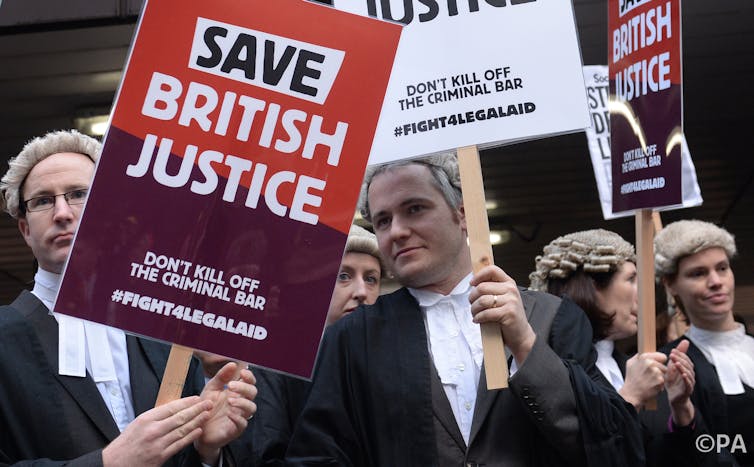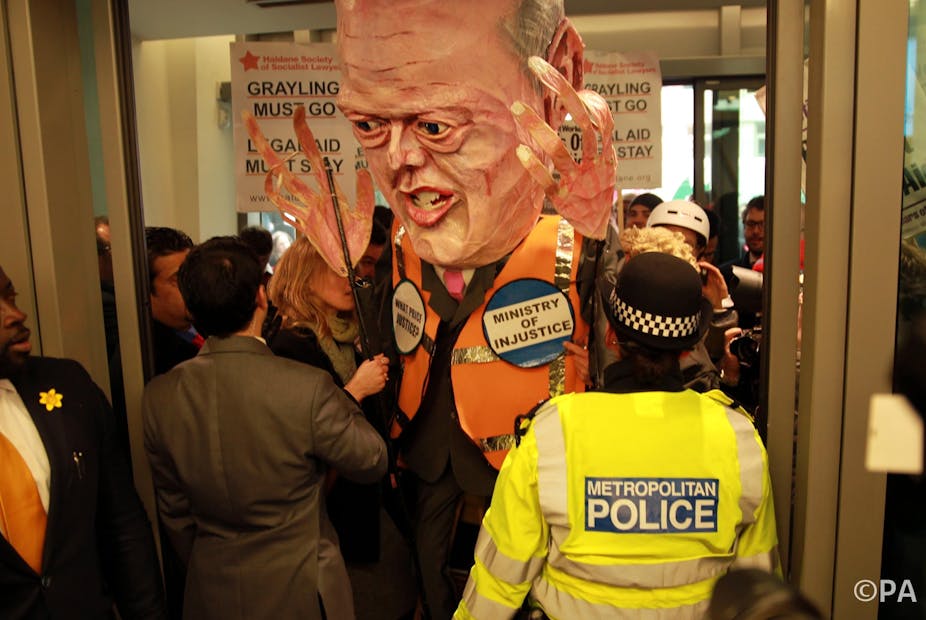There may never be a more appropriate epitaph for Chris Grayling’s time as justice secretary than that offered when he addressed the Joint Committee on Human Rights last year. As committee chair, Hywel Francis said, Grayling’s views relating to people’s access to justice are those of “a man who knows the price of everything, yet the value of nothing”.
As Francis acknowledged, that pithy put down originated with Oscar Wilde, and was intended to describe a philistine; only, in Grayling’s case, it was not offered as a jibe about his lack of cultural refinement but rather the sheer disinterest in issues of justice. Whether or not he has finely developed aesthetic values is neither here nor there, but the lack of regard he shows for the values of due process and the equality of arms are of utmost importance considering that this is the man tasked with looking after the British justice system, which will likely never again be tagged with the once-popular axiom of being the best in the world.
Since taking over from the rather more liberal, Kenneth Clarke Grayling has attacked human rights as “political correctness”, proposed dramatic restrictions to the right of individuals to challenge the state through judicial review, imposed significant restrictions on access to lawyers with no-win no-fee cases, moved the government back on to the course of building more (and bigger) prisons – despite the evidence against them – and is set on dramatically privatising up to 70% of the probation service ceding state responsibility for offenders to commercial enterprises.
He has already decimated civil legal aid, with a set of proposals so controversial that they were defeated 14 times in the House of Lords, so that the majority of cases in areas such as divorce, housing and benefits are no longer funded. The civil budget was slashed by a quarter, some £320m.
Brief interlude
Grayling is attempting similar with crime and last week saw the first full day barrister walk-out in the history of England and Wales – it really is an impressive feat to push that most august and refined of professions to the barricades, placards in hand. Cast as a day of shame for Grayling, the action was a strike in all but name; barristers and solicitors taking to the street as they refused to act in court following the Ministry of Justice confirming its package of cuts to the criminal legal aid budget.

Fees will be cut by up to 30% in an effort to dislodge £220m from the annual bill. There will also be a tendering process for contracts offered to firms of solicitors that can claim, at least, 20% efficiency cuts on present levels, which will lead to a two-thirds reduction in the number of firms.
Contracting will create advice deserts, with large swaths of the population unserved by a local law firm. As it stands, a vital part of running an effective practice comes from lawyers either having prior knowledge of their clients or, at least, understanding the issues and cultures of the communities from which they are drawn. This means lawyers can quickly get a handle on the client’s needs.
Those defendants that still live near law firms may be in for a nasty surprise as lawyers increasingly have to work to sausage factory processes of representation: churning a large volume of clients through their doors in order to reach toward profitability. The notion of personalised service will go out of the window, especially so as the proposals include a financial (dis)incentive whereby lawyers can be rewarded for early guilty pleas, encouraging them to push their clients to admit offences.
Justice not a private function
Taking all this into account it was interesting to listen to what Grayling had to say for himself at the Policy Exchange when he joined a panel debating the privatising of justice. Fundamentally, Grayling’s various reforms while justice secretary can be labelled privatisations – whether in name as with the offender rehabilitation services and the super prisons, or in effect, by facilitating a two-tier system of legal representation whereby private justice buys better (or any) lawyers. He defended these moves as promoting creativity through removing the supposed constraints of the public sector. Grayling did, though, notably stop short at the courts, which he said would not be privatised (though would be afforded greater freedom somehow).
Addressing the companies that would be brought into areas such as probation and prison, he defended payment by results as inherently sensible and said the central issue for the Ministry of Justice would be how effective they were in reducing reoffending. That benchmark seems to ignore the figures on recidivism amongst the prison population, that his predecessor Kenneth Clarke understood but, all the same, he stuck to this position.
Grayling’s faith in the power of the market is impressive in that it affords him the confidence to outsource something as crucial as liberty to G4S, who failed to even properly manage crowds gathered to watch a few people running and jumping. In the name of cost cutting, less experienced staff is hired on lower wages to supervise greater numbers of inmates with the very real prospect that prisoners come out in a worse situation than when they went in. Grayling’s attitude is that he will somehow take into account such medium- to long-term impacts in enough time to make a meaningful impact on the contract at the time. This seems to suggest some degree of anticipation, when all the experts are already engaged in such predictive activity and warn him against moving towards privatisation in areas such as probation.
Our justice secretary, then, seems determined to press on with his intention to reform our legal system in the round. Whether this is due to ideology, austerity or some combination of the two, what is clear is that the policies Grayling has led will have massive and long-lasting effects. His decisions now should resonate far in the future and, though it will not necessarily be fondly, his time in the job will probably endure in the consciousness of legal professionals and those who rely on the justice system far more profoundly than the performance of those who held the office before him.

